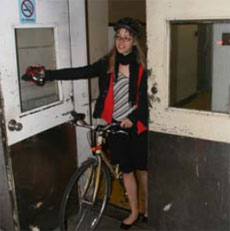Monday: ‘Bikes in Buildings’ Showdown at City Hall
 Photo of the bike-accessible workplace at 6 West 48th Street: Transportation Alternatives [PDF]
Photo of the bike-accessible workplace at 6 West 48th Street: Transportation Alternatives [PDF]On Monday afternoon the City Council’s transportation committee will take up the Bikes in Buildings Bill, which addresses a major obstacle to bike commuting. The legislation would give people who work in commercial buildings the right to bring their bikes inside the workplace, if they have the consent of their employer. Transportation Alternatives director Paul White calls it "one of the easiest ways to enable much greener travel in New York City." The bill’s prospects look promising: Bloomberg reports that it enjoys the active support of the mayor, and most of the City Council is expected to sign on.
The public can testify at Monday’s hearing, scheduled to begin at 1:00 p.m. in the main council chamber at City Hall.
Opposition stems from the Real Estate Board of New York, which is expected to testify against the bill. "I’m sorry but bringing a bike into a narrow or crowded lobby is not necessarily a safe thing," REBNY President Steve Spinola told Streetsblog soon after the hearing was first scheduled. "If
somebody brings a bike in and hits somebody, whether it’s a woman — a
pregnant woman — or a man, or whatever, and hurts them, well number
one, not only will possibly that bicyclist be sued, but I can guarantee
you that they’re going to be suing the building owner, arguing that
they left an unsafe situation."
Empirical evidence of the supposed hazards posed by bicycles is in short supply. "REBNY has been raising the liability issue for months now," said White. "The fact is
they haven’t marshaled a single example of a building that has
sustained damage or incurred liability or otherwise experienced
problems with allowing bicycles inside." T.A. has been compiling a dossier of buildings that let bikes inside, and White says they’ve found that "it’s completely doable, completely easy, and actually is a valuable amenity to tenants."
White sees a parallel to other red herrings dangled about when transportation reforms first surface. "It’s the same kind of argument that we heard in the nineties about
traffic calming," he said, "that if you built curb extensions or put in
speed humps or other kinds of devices that people would be injured by
them and they would sue. And it was proved to be completely unfounded."
REBNY also maintains that sufficient progress can be made through voluntary measures and a zoning amendment that would apply to new construction. "We’ve asked our members to try to
figure out ways of encouraging accessibility for people who want to
bring their bikes, but we don’t think that the city should be mandating
it for existing buildings," said Spinola. "We believe that for new construction, there
is a reasonable requirement that could be made, and in speaking to my
building owners, they understand that, and we’ve been talking to City
Planning about doing that."
The zoning amendment, however, will leave the vast majority of office buildings unaffected. White believes that voluntary compliance will likewise leave huge gaps. "I think if you take all the commercial buildings you’d have something
of a bell curve," he told us. "On one end of the curve you’d have the buildings that
are doing something already, really taking the lead, being proactive
about enabling bike access. On the other end of the curve, you have
buildings that are very resistant to it, for whatever reason. And in
the middle you have buildings that really don’t feel strongly either
way, but the only way that they would really enable access would be if
they were compelled through this kind of legislation."